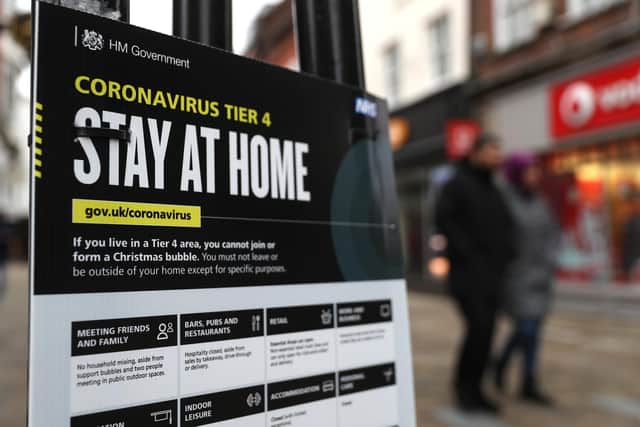What we got right during the pandemic and what we got wrong - Andy Brown
Lives were saved by trusting the science of inoculation whilst a lot of harm was done by a small number of people who spread false rumours that exaggerated the rare risks of side effects and downplayed the huge benefits of increased immunity.
The efforts to procure a lot of personal protective equipment at very short notice were less impressive. Bypassing the normal procurement rules to get things done quickly was an understandable necessity in a crisis. Awarding quite so many contracts to companies with little track record of producing what was needed was not.
Advertisement
Hide AdAdvertisement
Hide AdBillions of pounds of public money ended up in the hands of friends and relatives of decision makers in return for supplying shoddy equipment late in the day. Those pesky rules on making sure public money is spent honestly are actually rather important and need to be followed scrupulously in normal circumstances. A lot more care to avoid patronage needs to be taken if they are ever set aside in an emergency.


At the start of the pandemic the government was too slow to act, partly because they were worried about whether the public would put up with restrictions on their private lives and follow challenging rules.
It turned out that the vast majority of the British people were remarkably good at doing whatever was necessary. Even when it came at huge personal cost like not being able to visit relatives or attend funerals.
By contrast a remarkably high proportion of those who made the rules couldn’t be trusted to obey them. The most senior government adviser travelled a couple of hundred miles and then went for a drive to test his eye sight. The Health Minister got rather close to his mistress at a time when he was telling the rest of us to keep our social distance. Both the then Prime Minister and the current Prime Minister attended social gatherings that resulted in them getting fined by the police.
Advertisement
Hide AdAdvertisement
Hide AdThe long list of people that you need and can trust in an emergency includes doctors, nurses, care workers, refuge collectors, transport workers and people in the retail industry. It is not a great idea to show huge appreciation for those people in the depths of a pandemic and then to neglect them as soon as it is over.
It is important to have the ability to produce vaccines and equipment locally. In extreme circumstances reliable local food supplies are exceptionally important and it is not a great idea to be over reliant on imports.
Local communities matter and there is an astonishing network of volunteers out there who will rally round and help friends, neighbours and complete strangers. In many local areas there were far more people offering to help than needing it and a lot of very good people gave their time to make sure those in need got both groceries and some important emotional support at a difficult time.
Having a supportive family or a household of people you trust is the single most important thing that gets you through a crisis. Strong and reliable personal relationships tend to be a lot more useful than income or position. There are costs to neglecting them and time spent strengthening those ties is very well spent.
Advertisement
Hide AdAdvertisement
Hide AdCommuting to the office is an over rated pastime. A remarkable amount of good work can be done very effectively without leaving home. A world without cars, planes and air pollution can be rather pleasant. Many people found the experience of walking in silence through safer streets to be significantly therapeutic. Time spent in the great outdoors is hugely valuable and those who were fortunate enough to live in locations where they could get out into the countryside for their daily exercise found lockdown a lot easier than people in high rise flats in inner cities. It is possible to enjoy sharing activities remotely over the internet. Collective exercise classes, shared music, comedy clips and pictures of cats doing daft things helped get us through. They were no substitute for the joys of being able to give someone a simple hug.
Being prepared for a crisis is a good idea. Thinking about what helps to cause a pandemic and trying to avoid another one is also rather sensible.
If we don’t want to go through the experience again then it might be wise to avoid caging wild animals in dreadful conditions in food markets and also stop using laboratories to experiment with horrible diseases in case they are useful in wars.
Above all we need to treat the Covid pandemic as a practice run that can help us prepare for a more serious outbreak of disease.
It could easily all happen again and it would be nice to be a bit better prepared.
Andy Brown is the North Yorkshire Councillor for Aire Valley.